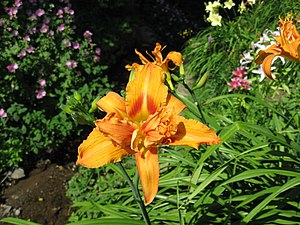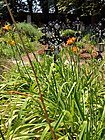Note: This is a project under development. The articles on this wiki are just being initiated and broadly incomplete. You can Help creating new pages.
Difference between revisions of "Hemerocallis fulva"
| Line 1: | Line 1: | ||
[[File:Apricot Beauty.pp.JPG|thumb|right]] | [[File:Apricot Beauty.pp.JPG|thumb|right]] | ||
| + | '''Hemerocallis fulva''' is a usually herbaceous perennial plant, though some forms remain evergreen in winter. Growing from fleshy roots with a swollen tuberous part near the tip, and rhizomes up to 30cm long, the plant forms a clump of leafy stems that can range from 40 - 90cm tall and flowering stems up to 150cm. | ||
==Uses== | ==Uses== | ||
| − | {{Uses|}}, {{Uses|}}, {{Uses|}}, {{Uses|}}, {{Uses|}}, {{Uses| | + | {{Uses|Parasitic worms}}, {{Uses|Oppilation}}, {{Uses|Jaundice}}, {{Uses|Constipation}}, {{Uses|Pneumonia}}, {{Uses|Cancer}}.<ref name="Uses"/> |
==Parts Used== | ==Parts Used== | ||
| − | {{Parts Used|}}, {{Parts Used| | + | {{Parts Used|Leaves}}, {{Parts Used|Young shoots}}, {{Parts Used|Flowers}}, {{Parts Used|Flower buds}}, {{Parts Used|Tubers}}. |
==Chemical Composition== | ==Chemical Composition== | ||
| Line 28: | Line 29: | ||
==Habit== | ==Habit== | ||
| − | {{Habit|}} | + | {{Habit|Perennial}} |
==Identification== | ==Identification== | ||
| Line 47: | Line 48: | ||
==Mode of Propagation== | ==Mode of Propagation== | ||
| − | {{Propagation|}} | + | {{Propagation|Seeds}}, {{Propagation|Division in spring}}. |
==How to plant/cultivate== | ==How to plant/cultivate== | ||
| − | <ref name="How to plant/cultivate"/> | + | This species is hardy to about -20°c. Succeeds in most soils, including dry ones, though it prefers a rich moist soil.<ref name="How to plant/cultivate"/> |
==Commonly seen growing in areas== | ==Commonly seen growing in areas== | ||
| − | {{Commonly seen|}}, {{Commonly seen|}}, {{Commonly seen|}}, {{Commonly seen| | + | {{Commonly seen|Forests}}, {{Commonly seen|Thickets}}, {{Commonly seen|Grasslands}}, {{Commonly seen|Streamsides}}. |
==Photo Gallery== | ==Photo Gallery== | ||
| Line 67: | Line 68: | ||
<references> | <references> | ||
| − | <ref name="chemical composition">[ | + | <ref name="chemical composition">[Chemistry]</ref> |
| − | <ref name="Leaf">[ | + | <ref name="Leaf">[Morphology]</ref> |
| − | <ref name="How to plant/cultivate">[ | + | <ref name="How to plant/cultivate">[http://temperate.theferns.info/plant/Hemerocallis+fulva Cultivation]</ref> |
<ref name="Uses">Indian Medicinal Plants by C.P.Khare</ref> | <ref name="Uses">Indian Medicinal Plants by C.P.Khare</ref> | ||
</references> | </references> | ||
==External Links== | ==External Links== | ||
| − | * [ ] | + | * [http://www.flowersofindia.net/catalog/slides/Orange%20Daylily.html Hemerocallis fulva on flowersofindia.net] |
| − | * [ ] | + | * [http://www.missouribotanicalgarden.org/PlantFinder/PlantFinderDetails.aspx?kempercode=k430 Hemerocallis fulva on missouribotanicalgarden.org] |
| − | * [ ] | + | * [http://www.plantsoftheworldonline.org/taxon/urn:lsid:ipni.org:names:536335-1 Hemerocallis fulva on plantsoftheworldonline.org] |
[[Category:Herbs]] | [[Category:Herbs]] | ||
[[Category:Pages without herbs images]] | [[Category:Pages without herbs images]] | ||
Latest revision as of 15:40, 15 May 2020
Hemerocallis fulva is a usually herbaceous perennial plant, though some forms remain evergreen in winter. Growing from fleshy roots with a swollen tuberous part near the tip, and rhizomes up to 30cm long, the plant forms a clump of leafy stems that can range from 40 - 90cm tall and flowering stems up to 150cm.
Contents
- 1 Uses
- 2 Parts Used
- 3 Chemical Composition
- 4 Common names
- 5 Properties
- 6 Habit
- 7 Identification
- 8 List of Ayurvedic medicine in which the herb is used
- 9 Where to get the saplings
- 10 Mode of Propagation
- 11 How to plant/cultivate
- 12 Commonly seen growing in areas
- 13 Photo Gallery
- 14 References
- 15 External Links
Uses
Parasitic worms, Oppilation, Jaundice, Constipation, Pneumonia, Cancer.[1]
Parts Used
Leaves, Young shoots, Flowers, Flower buds, Tubers.
Chemical Composition
Common names
| Language | Common name |
|---|---|
| Kannada | |
| Hindi | |
| Malayalam | |
| Tamil | |
| Telugu | |
| Marathi | |
| Gujarathi | |
| Punjabi | |
| Kashmiri | |
| Sanskrit | |
| English |
Properties
Reference: Dravya - Substance, Rasa - Taste, Guna - Qualities, Veerya - Potency, Vipaka - Post-digesion effect, Karma - Pharmacological activity, Prabhava - Therepeutics.
Dravya
Rasa
Guna
Veerya
Vipaka
Karma
Prabhava
Habit
Identification
Leaf
| Kind | Shape | Feature |
|---|---|---|
Flower
| Type | Size | Color and composition | Stamen | More information |
|---|---|---|---|---|
| {{{5}}} |
Fruit
| Type | Size | Mass | Appearance | Seeds | More information |
|---|---|---|---|---|---|
Other features
List of Ayurvedic medicine in which the herb is used
Where to get the saplings
Mode of Propagation
How to plant/cultivate
This species is hardy to about -20°c. Succeeds in most soils, including dry ones, though it prefers a rich moist soil.[4]
Commonly seen growing in areas
Forests, Thickets, Grasslands, Streamsides.
Photo Gallery
References
- ↑ Indian Medicinal Plants by C.P.Khare
- ↑ [Chemistry]
- ↑ [Morphology]
- ↑ Cultivation
External Links
- Ayurvedic Herbs known to be helpful to treat Parasitic worms
- Ayurvedic Herbs known to be helpful to treat Oppilation
- Ayurvedic Herbs known to be helpful to treat Jaundice
- Ayurvedic Herbs known to be helpful to treat Constipation
- Ayurvedic Herbs known to be helpful to treat Pneumonia
- Ayurvedic Herbs known to be helpful to treat Cancer
- Herbs with Leaves used in medicine
- Herbs with Young shoots used in medicine
- Herbs with Flowers used in medicine
- Herbs with Flower buds used in medicine
- Herbs with Tubers used in medicine
- Habit - Perennial
- Index of Plants which can be propagated by Seeds
- Index of Plants which can be propagated by Division in spring
- Herbs that are commonly seen in the region of Forests
- Herbs that are commonly seen in the region of Thickets
- Herbs that are commonly seen in the region of Grasslands
- Herbs that are commonly seen in the region of Streamsides
- Herbs
- Pages without herbs images





